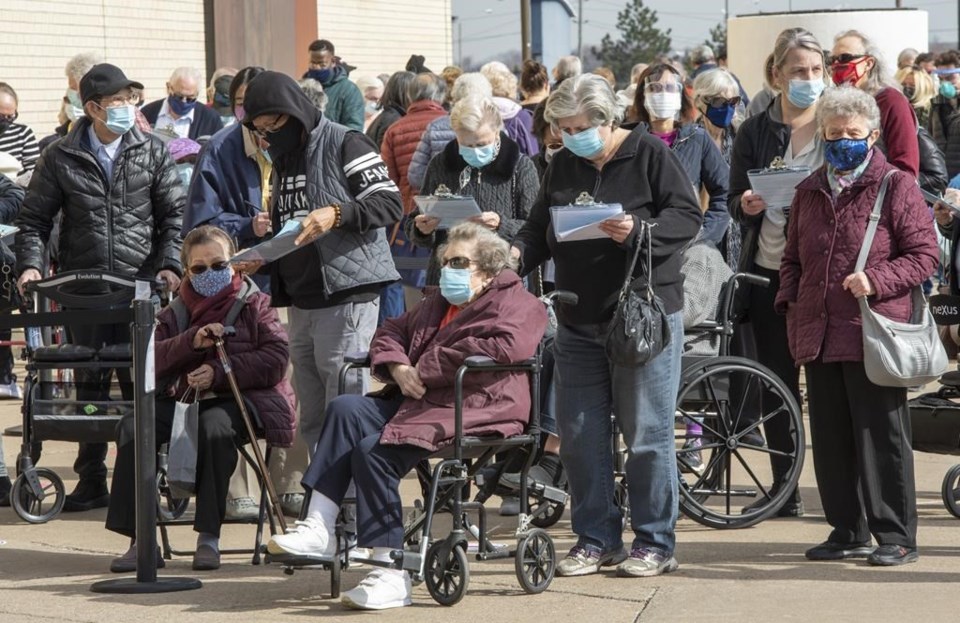TORONTO — Ontario family doctors called Tuesday be more involved in the COVID-19 vaccination effort, saying they could boost uptake, but the government said their participation would be limited to a supply-dependent pilot project for now.
The president of the Ontario Medical Association said the time is right for broader involvement of family doctors, who have only been participating in select public health units, now that Ontario is expecting more vaccines that don't require extreme cold storage.
"I think it's time to significantly empower family doctors to protect their patients," Dr. Samantha Hill, president of the Ontario Medical Association said in an interview. "We do that by sending significant quantities of all of the non-Pfizer vaccines, whatever comes to our doors next, to primary care doctors so that they can meet this next phase of demand."
Hill said family doctors are well-positioned to help people who are unable to travel to mass clinics, vaccine hesitant people and people at higher risk of infections.
The Ontario College of Family Physicians said primary-care doctors could push overall participation in the province's immunization program to nearly 90 per cent.
In making its case, the group said it had conducted a survey that found 60 per cent of vaccine-hesitant respondents were more likely to get immunized if a family doctor endorsed and administered their shot.
Some family physicians in six regions are currently offering Oxford-AstraZeneca shots to patients aged 60 and older as part of a pilot project. As of Tuesday, the government said those doctors had used about half of the 29,000 doses they had been sent.
The program is currently operating in Toronto, Peel Region, Hamilton, Guelph, Peterborough and Simcoe-Muskoka, with doctors calling eligible patients to schedule appointments.
Solicitor General Sylvia Jones said the program will expand, but she couldn't specify to where or when because the government doesn't yet know when more doses of the Oxford-AstraZeneca vaccine will arrive.
Jones didn't rule out eventually having family doctors administer the Moderna vaccine as well, but said the Oxford-AstraZeneca shot was best suited for primary care physicians for now.
"It is frankly a little easier vaccine to be able to move around, to store, so that is why we have put it with the primary care practitioners," she said. "As we see supplies increase, then those conversations can continue, but right now it is AstraZeneca."
The U.S. is expected to send 1.5 million Oxford-AstraZeneca shots to Canada before the end of the month.
Opposition politicians criticized the government for failing to fully involve family doctors in the vaccination effort.
"They've been left on the on the sidelines and I think that was a miscalculation by the government," said NDP Leader Andrea Horwath.
Liberal health critic John Fraser said the government shouldn't still be running pilot projects at this point.
"You need a plan and you need to execute it," he said.
At least one Ontario health unit said Tuesday that it will have some family doctors administer the Moderna vaccine as part of a local pilot project. Four primary care groups in Lambton Public Health will receive a total of 2,600 doses that will go to patients with high-risk chronic health conditions.
Ontario's supply of the Moderna vaccine is expected to increase in the coming weeks. The province says 97,000 doses are coming this week, and between 220,000 and more than 440,000 weekly doses are expected over the next three weeks.
Jones said some of the incoming Moderna supply will go to pharmacies in the Toronto, Kingston and Windsor regions that are currently offering the Oxford-AstraZeneca vaccines to people 60 and older.
The pharmacies in that pilot project have used more than 70 per cent of the 165,000 Oxford-AstraZeneca doses they received earlier in the month, the government said Tuesday.
Jones said the province still plans to expand the pharmacy project, although the government has not yet specified which other regions it will grow to.
The government also reminded residents Tuesday not to show up for vaccination appointments far ahead of schedule.
Lineups at some mass vaccination sites were reported in Toronto as the city vaccinates residents aged 75 and older. Local officials have urged those with appointments to show up only shortly before their time-slot, a call Jones repeated.
"People are excited to get the vaccine, they want to have that first shot and I can't blame them," she said. "We have regularly asked people not to arrive two or three hours early for your vaccine."
The government also pledged on Tuesday to spend $3.7 million to help seniors and Ontarians with disabilities get vaccinated by helping transport them to immunization sites and, in some cases, bringing shots to them.
Ontario outlined strategies for vaccinating priority groups in the next phase of the rollout set to begin in April. The phase will offer shots to people who are considered at risk due to their age, job, neighbourhood or health condition.
A document shared with health units and clinics broke down categories of people who can't work from home. It encouraged workplace vaccinations and said employers should consider letting workers use paid time off to get their shots.
The government advised health units to work with communities to make vaccines accessible in hot spot neighbourhoods.
It also advised clinics to develop lists of backup recipients for remaining doses if people don't show up to appointments.
This report by The Canadian Press was first published March 23, 2021.
Holly McKenzie-Sutter, The Canadian Press
